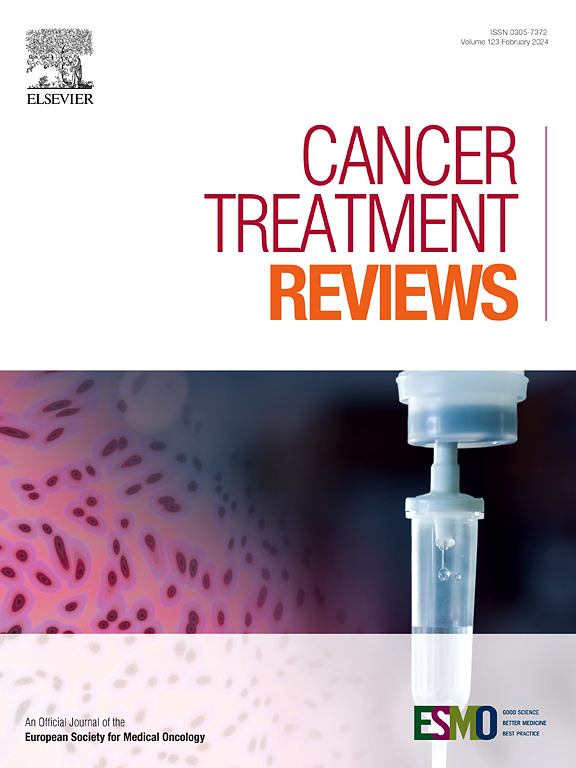First versus second-generation molecular profiling tests: How both can guide decision-making in early-stage hormone-receptor positive breast cancers?
IF 9.6
1区 医学
Q1 ONCOLOGY
引用次数: 0
Abstract
Hormone receptor-positive (HR+) and human epidermal growth factor receptor 2-negative (HER2-) tumors represent the most common types of early-stage breast cancer. However, their response to adjuvant systemic treatments varies widely due to tumor heterogeneity. Current decisions for adjuvant treatment rely heavily on clinical and pathological characteristics, which can sometimes lead to overtreatment. Accurately identifying patients who will benefit from adjuvant chemotherapy at an individual level remains a challenge. Multigene profiling assays are now widely used in clinics to better assess recurrence risk and chemotherapy response for HR+ disease. In this report, we examine the advantages and limitations of two widely used molecular profiling tests—Oncotype DX and Prosigna. Both Oncotype DX and Prosigna have been demonstrated to be effective prognostic tools in early breast cancer, with Oncotype DX also being validated as a predictive tool to guide chemotherapy decisions. We focus on studies that directly compare these molecular tests and discuss how their strengths can be leveraged to improve clinical decision-making for early-stage HR+ breast cancers. Finally, we highlight remaining knowledge gaps and propose directions for future research.
第一代与第二代分子分析测试:如何指导早期激素受体阳性乳腺癌的决策?
激素受体阳性(HR+)和人表皮生长因子受体2阴性(HER2-)肿瘤是早期乳腺癌最常见的类型。然而,由于肿瘤的异质性,他们对辅助全身治疗的反应差异很大。目前辅助治疗的决定很大程度上依赖于临床和病理特征,这有时会导致过度治疗。在个体水平上准确地确定哪些患者将受益于辅助化疗仍然是一个挑战。多基因谱分析现在广泛应用于临床,以更好地评估HR+疾病的复发风险和化疗反应。在本报告中,我们研究了两种广泛使用的分子分析测试- oncotype DX和Prosigna的优点和局限性。Oncotype DX和Prosigna已被证明是早期乳腺癌的有效预后工具,Oncotype DX也被验证为指导化疗决策的预测工具。我们专注于直接比较这些分子测试的研究,并讨论如何利用它们的优势来改善早期HR+乳腺癌的临床决策。最后,我们强调了存在的知识空白,并提出了未来研究的方向。
本文章由计算机程序翻译,如有差异,请以英文原文为准。
求助全文
约1分钟内获得全文
求助全文
来源期刊

Cancer treatment reviews
医学-肿瘤学
CiteScore
21.40
自引率
0.80%
发文量
109
审稿时长
13 days
期刊介绍:
Cancer Treatment Reviews
Journal Overview:
International journal focused on developments in cancer treatment research
Publishes state-of-the-art, authoritative reviews to keep clinicians and researchers informed
Regular Sections in Each Issue:
Comments on Controversy
Tumor Reviews
Anti-tumor Treatments
New Drugs
Complications of Treatment
General and Supportive Care
Laboratory/Clinic Interface
Submission and Editorial System:
Online submission and editorial system for Cancer Treatment Reviews
 求助内容:
求助内容: 应助结果提醒方式:
应助结果提醒方式:


